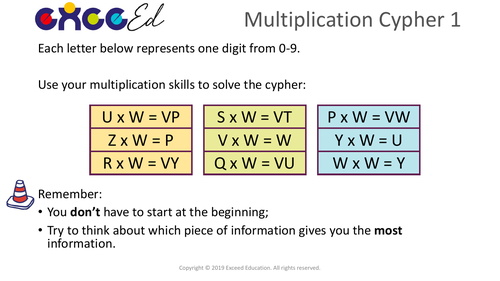

Do your children need practice solving problems and puzzles? Do you need activities that specifically practise reasoning about multiplication? Then look no further than this ‘Start the Day’ activity pack.
This is the free sample version of the Multiplication Cypher: ‘Start the Day’ reasoning activity full pack which has 5 similar activities (each with teacher answers) in PDF and PowerPoint form for easy printing and sharing with your children on an interactive whiteboard. This pack could also be used for challenging more able children (who already know their times tables) during whole class practice/fluency sessions.
The activity is designed to help children master multiplication, including (but not limited to):
- Recognising square numbers as products;
- Recognising the properties of the factors and multiples of different numbers;
- Reasoning about numbers multiplied by 1 and 0, and how this helps in the big picture of a problem;
- Recognising patterns between the number of tens and ones in a product, and the factors of these products;
- Considering the problem solving strategies of trial and improvement, working systematically, and logical reasoning.
The answer pages provide some reasons to allow teacher and pupil discussion during the plenary.
Tips on how to deliver these activities:
- On the first occasion you use these activities, allow children a free run at solving the puzzle, perhaps with some very minor discussion around the the rules (0-9 digits and how they are used in 1 and 2-digit number representations);
- Allow children to talk through their strategies for finding solutions, encouraging pupil voice in both paired and whole-class discussions;
- If necessary (some children won’t find a way to solve the problem without a system), share a way to work backwards. How many times tables have only two 1-digit products? (5, 6, 7, 8, 9). How many square numbers have only a 1-digit answer? (1, 2, 3). How many square numbers have ones in the product that are the same as the multiple being used? (1, 5, 6). Etc.
- Encourage children to think about what they did to make the problem smaller;
- Ask children how they could adapt the problem to make it easier, or more challenging (for example through using more numbers in the set, or through forcing a key rule (e.g. the odd one out must be because of its factors);
- Use one activity per week over a half term to encourage regular revisiting of the content (multiplication) and strategies (working backwards/trial and improvement);
- Have children create their own versions and send them to us to challenge our followers - Twitter: @UKExceED
Something went wrong, please try again later.
This resource hasn't been reviewed yet
To ensure quality for our reviews, only customers who have downloaded this resource can review it
Report this resourceto let us know if it violates our terms and conditions.
Our customer service team will review your report and will be in touch.
